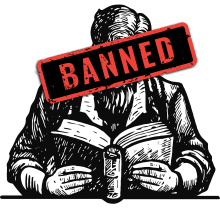
The American Library Association (ALA) has reported that 4,240 unique book titles were targeted for censorship in school and public libraries in 2023, a 65 percent increase over the prior year. For public libraries alone, the percentage increase over 2022 was an incredible 92 percent. Proponents of book bans argue some books are just not appropriate for all ages while opponents fear an escalating erosion of educational diversity.
The attempt to ban books in America is nothing new. Ovid's Ulysses, Shakespeare's Richard II, and Martin Luther's German translation of the Bible have all come under literal fire. The first nationwide ban of a book in the United States was Harriet Beecher Stowe’s Uncle Tom’s Cabin, a book barred by the Confederacy for its pro-abolitionist agenda and innate ability to spark heated debates about slavery.
According to a “heat map” published by the ALA, the country’s book-banning hot spots are Florida and Texas. Florida made 33 attempts to ban 2,672 unique book titles; Texas tried 49 times to censor 1,470 titles. Conservative groups in California filed 52 attempts to ban 98 titles until Gov. Newsom signed AB 1078 in September of 2023 that “bans” book bans in schools and prohibits censorship of instructional materials. Vermont was the only state that had zero attempts at book censorship.
The focus of these bans predominantly involves books representing LGBTQIA+ and BIPOC voices, comprising 47 percent of the challenged materials. Organizations like PEN America have also reported a significant increase in book bans, particularly in the school year of 2023-2024, documenting more than 4,000 instances in just the first half of the school year. The focus of these bans has increasingly been on books discussing sensitive topics such as race, sexual violence, and LGBTQ+ identities, reflecting broader societal conflicts over these issues.
On the other side, proponents of book bans argue that some books contain content not suitable for all ages, particularly in school settings, says NPR affiliate WUSF. They advocate for parental and community involvement in the educational materials accessible to children, emphasizing the protection of students from explicit or inappropriate content. This viewpoint stresses the importance of community standards in shaping school libraries and curricula.
In states like Florida, legislation has been introduced to allow greater parental oversight regarding the educational resources used in schools. Advocates of these measures argue that they are safeguarding educational environments by ensuring content is appropriate for school-aged children.
Ultimately, book bans and their impact on the meaning of free speech reflect deeper societal divisions over cultural and educational values. Proponents of book bans argue for protective measures in educational content, while opponents see these actions as threats to intellectual freedom and educational diversity.
As this issue evolves, it remains a significant flashpoint in discussions about the role of education in shaping societal values and individual rights in the United States.
Want to learn more? Source information for this article can be found here.
